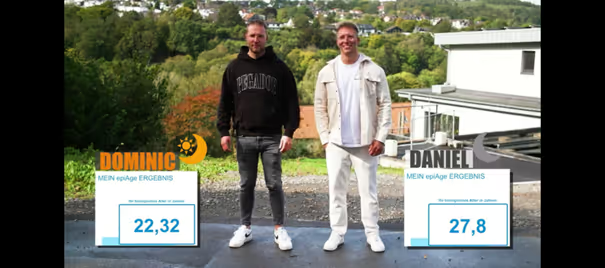Breaking news: epiAge has once again been enrolled in an exciting medical experiment – this time to investigate the role of chronobiology as a key lifestyle pillar.
This week, we appeared on TV for the 6th time. As “usual”, the aim here was not only to demonstrate the influence of lifestyle on longevity, but also to measure it precisely – with the epiAge test.
Nowadays, most of us are aware that nutrition, exercise, sleep and stress management are the most important health factors. However, the TV programme uncovered another key factor: individual biorhythms.
So how can we single out this variable from other everyday aspects? With the help of twins, of course – by far, the favourite test persons when it comes to (epi)genetic studies!
Why? Because twins share a common baseline: they are almost the same age and share a very similar (if not identical) gene pool. Furthermore, they often grew up together and were raised similarly. This makes it possible to more precisely assess the effects of different lifestyles in adulthood.
In this respect, 28-year-olds Dominic and Daniel are perfect candidates: they look the same and grew up in similar circumstances, BUT their careers and lifestyles have evolved in very different directions. So, this enables researchers to make a surprising discovery.

Commercial clerk Dominic is more of a bon vivant and a couch potato. His work alternates between early and late shifts. In contrast, baker Daniel is into clean eating and he exercises regularly. But every day, he starts work at 4:30 a.m. Dominic feels great while Daniel is often exhausted, even though he goes to bed early.
So what do these lifestyles mean in terms of biological ageing? The epiAge test has rather disturbing news for the young men: bon vivant Dominic has a biological age of 22.32, whereas health-conscious Daniel is a whopping 27.8 years old.
How come? Daniel is the healthy one... Doesn’t that sound rather unfair or even unlikely?
Well, it appears that the men’s divergent biorhythms are the true game changers here: Dominic works more or less in alignment with his natural daytime rhythm, while Daniel unwittingly works against his innate night owl pattern. This explains why Daniel’s healthy lifestyle efforts cannot compensate for his disturbed sleep-wake pattern.
So, personal biorhythms (or chronobiology, in general), seem to have a huge influence on human health and longevity!
You can watch how Daniel uses this new knowledge to adjust his daily schedule and regain energy on the German RTL Channel (RTLextra programme, 03.12.2024; 10:35 pm; in German; biorhythm feature from approx. min. 22:24).
++++
Illustrations
rawpixel & epiAge
RTL still
 Back to all posts
Back to all posts